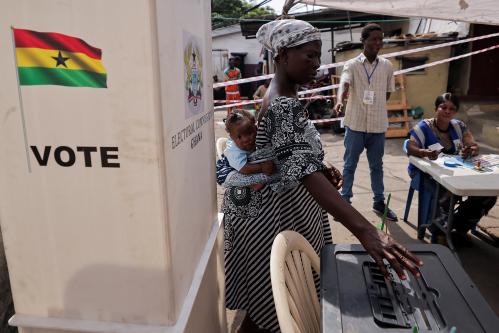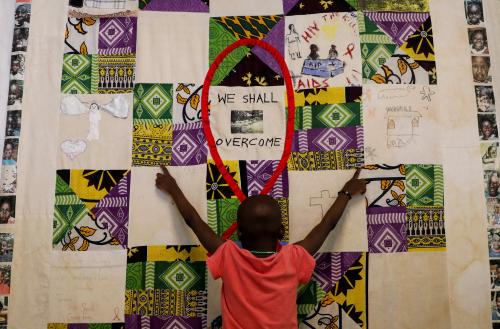This viewpoint is part of Foresight Africa 2024.
In the Political Declaration adopted in the leadup to the 2023 United Nations General Assembly Summit (UNGAS) on the United Nations Agenda 2030 and its Sustainable Development Goals (SDGs), United Nations (U.N.) member states declared that “the achievement of the SDGs is in peril” and are committed “to take the actions necessary to reverse declines and accelerate progress … and implement the SDGs.” Family-owned businesses (FOB), defined here, as “companies where members of the same family, or related family branches, hold a majority interest … and exerts a dominant influence on the strategic direction of the firm through ownership, governance, management and vision” can play a crucial role in accelerating progress in Africa towards achieving the SDGs. FOBs could also be critical for realizing the Aspirations of Agenda 2063, the African Union (AU) long-term plan for Africa’s structural transformation and development. South Korea provides a good example of a country where family-owned businesses known as chaebols, played a leading role in the structural transformation of that country and its emergence out of poverty.
Family-owned businesses are real-world schools of entrepreneurship apprenticeship.
According to a recent INSEAD report, FOBs and family-controlled businesses “account for two-thirds of all businesses, 70-89% of global GDP and 50-80% of all jobs in most countries.” In Africa, they account for about 70% of small and medium enterprises (SMEs). They differ in size, ownership type, and revenue. They include large conglomerates that dominate the economies of countries across the world and husband-and-wife shops along the streets. They incubate and nurture the fourth factor of production, entrepreneurship. Unfortunately, specific, focused policy discussions about their economic and social importance are rare. They are often subsumed, in policy discussions on industrialization, structural transformation, and economic growth in the private sector and MSMEs, as in SDG Target 8.3 which proposes to “promote development-oriented policies that support productive activities, decent job creation, entrepreneurship, creativity and innovation, and encourage the formalization of micro-, small- and medium-sized enterprises, including through access to financial services.”
Africa’s family-owned businesses have expanded in recent times due to a number of factors, including a) the retreat of the state in formerly socialist-oriented countries like Tanzania, b) the growing inability of the formal and informal sectors to create well-paying decent jobs, c) inadequate income from formal employment, d) the aspiration to be wealthy to provide adequately for offspring, e) limited availability of formal old age social security/pension, f) exposure to international experience, and g) leakages in public finances (high levels of corruption and the need to launder proceeds of corruption).
African FOBs are fettered by a number of factors, some exogenous others endogenous. Endogenous factors are largely governance-related and include failure to institute or plan for an orderly succession upon the death of the founder. Exogenous challenges include the fast pace of technological change and globalization that have made possible trade across borders, exposing family-owned businesses to greater global competition than FOB’s in other parts of the world during their nascence. Second, many African countries are facing a very unfavorable macroeconomic environment, with rising debt burden, high inflation, and shortages of foreign exchange, all adversely affecting the capacity of FOBs to survive, compete, or scale up. Furthermore, FOBs are very vulnerable to political uncertainty, and many have fallen victim to the rise of ethnic politics in many African countries. Also, countries are under pressure to mobilize additional domestic resources to finance the SDGs and Agenda 2063, and, in pursuit of this, they have introduced new taxes, expanded the tax bracket, and intensified tax efforts, actions which unfortunately fetter the growth of family-owned businesses. Finally, inadequate skills and knowledge make technological upgrading difficult and expensive for FOBs.
Exogenous constraints aside, FOBs face endogenous challenges the most important of which is governance. They often fail to put in place adequate and robust internal governance structures to either push the business to advance past the entrepreneurial stage or survive the death of the founder. Their growth can be constrained by the norm of reciprocity in traditional societies and Africa’s extended family system wherein the founder will be expected to hire family members, relatives, and friends without due consideration for competence and professionalism. The high incidence of poverty and resultant high dependency ratio creates a situation where the ownership of a business is interpreted as evidence of wealthiness and instigates expectations of financial support from relatives. Sending children to the West for higher education, a proclivity of Africa’s wealthy presents a risk to the survival of the FOB as some of these children may never return to continue and grow the businesses.
The initial source of funding can be another source of threat to the survival of the African family-owned business. Some of the larger family-owned businesses are either the “transformation” or conversions of corrupt enrichment by former government officials or the products of rent-seeking by the founders. Some of these businesses die upon the death of the founder as the conduits shut down. As social capital is difficult to transfer, a founder’s death could shut down the flow of the corrupt funds and/or rents that were the sources of growth of the business.
Recommendations
Governments should actively promote family-owned businesses in their own right, not as SMEs or private sector entities, given the very critical role they play in incubating and birthing new entrepreneurs and advancing economic growth. Governments should design and emplace appropriate policies, incentives and regulations to promote their growth and reduce their high mortality rates. Family-owned business-specific data should be collected on a regular basis by national statistical offices to aid research and decision/policymaking. They should also consider establishing a market to trade in family-owned businesses as transfer of ownership could reduce the high mortality rate of these businesses.
International trade is fundamental to the growth and survival of family-owned businesses. African governments should therefore assiduously implement the African Continental Free Trade Area (AfCFTA) as an additional engine of business growth. They should improve economic management as the poor macroeconomic environment, especially the lack of foreign exchange, in many African countries, has adversely affected FOBs, especially those lacking expansive “social capital.” FOBs should be incentivized to list on secondary stock exchanges (where they exist) and engage in succession planning using tax waivers.
Family-owned businesses are real-world schools of entrepreneurship apprenticeship. Many entrepreneurial aspirations die, and the irreplaceable corpus of knowledge and experience is lost when a family-owned business ceases to exist. The death of a family-owned business is a significant loss for countries seeking to create a class of entrepreneurs to advance the frontiers of their development and transform their economies.
The Brookings Institution is committed to quality, independence, and impact.
We are supported by a diverse array of funders. In line with our values and policies, each Brookings publication represents the sole views of its author(s).







Commentary
Family-owned businesses as incubators of entrepreneurs for Africa’s structural transformation
February 6, 2024